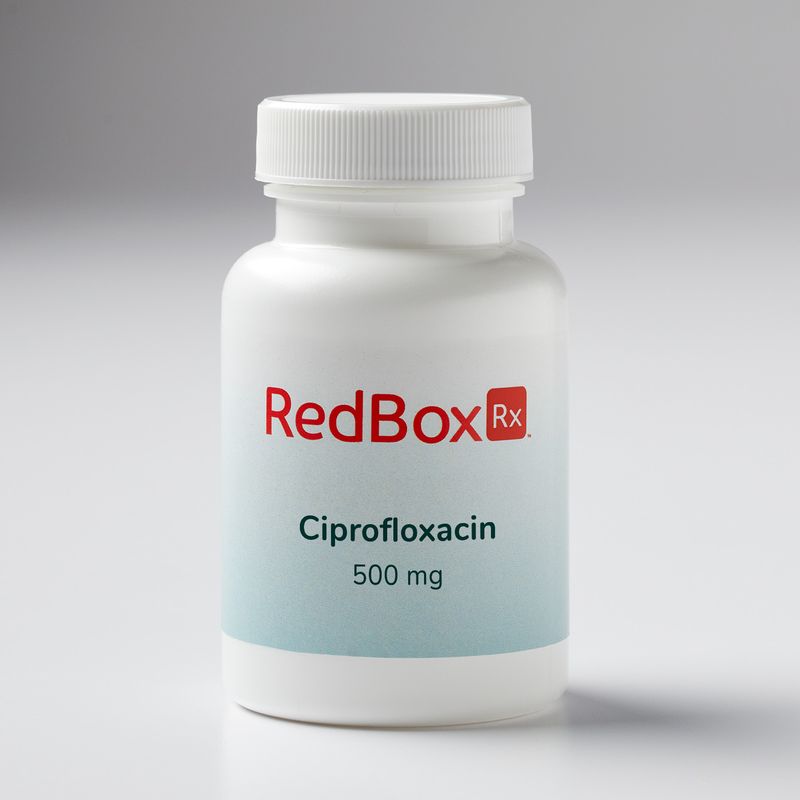Ciprofloxacin for Urinary Tract Infection FAQs
-
Ciprofloxacin is used to treat certain infections in many parts of the body, including urinary tract infections. Ciprofloxacin belongs to the class of medicines known as quinolone antibiotics. It works by killing bacteria or preventing their growth.1
However, this medicine will not work for colds, flu or other viral infections. Using antibiotics when they are not needed increases your risk of getting an infection later that resists antibiotic treatment.
-
Ciprofloxacin comes as a tablet, a suspension (liquid), and an extended-release tablet to take by mouth with or without food. The tablets and suspension are usually taken twice a day, and the extended-release tablets are usually taken once a day.
Take ciprofloxacin at around the same time(s) every day. The length of your treatment depends on the type of infection you have. Your doctor will tell you how long to take ciprofloxacin. Follow the directions on your prescription label carefully, and ask your doctor or pharmacist to explain any part you do not understand. Take ciprofloxacin exactly as directed. Do not take more or less of it, or take it more often than prescribed by your doctor.
One type of ciprofloxacin cannot be substituted for another. Be sure you receive only the type of ciprofloxacin that was prescribed by your doctor. Ask your pharmacist if you have any questions about the type of ciprofloxacin you were given.
Do not take ciprofloxacin with dairy products or calcium-fortified juices alone. However, you may take ciprofloxacin with a meal that includes these foods or drinks.
Swallow the tablets whole; do not crush or chew them. If your doctor tells you to split the 250 mg or 500 mg tablet, it may be broken in half along the scored line. Swallow the extended-release tablets whole; do not split, crush or chew them. If you cannot swallow tablets or extended-release tablets whole, tell your doctor.
If you are taking the suspension, shake the bottle well for 15 seconds before each use to mix the medication evenly. Swallow the correct dose without chewing the granules in the suspension. Close the bottle completely after each use. Do not give the suspension to a patient through a feeding tube.
Take ciprofloxacin until you finish the prescription even if you feel better. Do not stop taking ciprofloxacin without talking to your doctor unless you experience certain serious side effects listed in the IMPORTANT WARNING and SIDE EFFECTS sections. If you stop taking ciprofloxacin too soon or if you skip doses, your infection may not be completely treated, and the bacteria may become resistant to antibiotics.
-
You should begin to feel better during the first few days of treatment with ciprofloxacin. If your symptoms do not improve or if they get worse, call your doctor. Also call your doctor if you develop a fever or back pain during or after your treatment. These symptoms may be signs that your urinary tract infection is worsening.
-
Ciprofloxacin is only available by prescription2 and can be purchased online. Start a low-cost ($39) online consultation with RedBox Rx for a urinary tract infection to see if ciprofloxacin could be right for you.
-
Ciprofloxacin at RedBox Rx is available for $20, one of the lowest prices available online. No insurance required.
-
Before taking ciprofloxacin:
Tell your doctor and pharmacist if you are allergic or have had a severe reaction to ciprofloxacin; any other quinolone or fluoroquinolone antibiotics such as delafloxacin (Baxdela), gemifloxacin (Factive), levofloxacin (Levaquin), moxifloxacin (Avelox) or ofloxacin; any other medications, or if you are allergic to any of the ingredients in ciprofloxacin tablets or suspension. Ask your doctor or pharmacist for a list of the ingredients.
Tell your doctor if you are taking tizanidine (Zanaflex). Your doctor will probably tell you not to take ciprofloxacin while you are taking this medication.
Tell your doctor and pharmacist what other prescription and nonprescription medications, vitamins, nutritional supplements, and herbal products you are taking or plan to take. Be sure to mention the medications listed in the IMPORTANT WARNING section and any of the following: anticoagulants (blood thinners) such as warfarin (Coumadin, Jantoven); certain antidepressants; antipsychotics (medications to treat mental illness) such as clozapine (Clozaril, Fazaclo, Versacloz) or olanzapine (Zyprexa, in Symbax); azithromycin (Zithromax, Zmax); caffeine or medications that contain caffeine (Excedrin, NoDoz, Vivarin, others); clarithromycin (Biaxin, in Prevpac); cyclosporine (Gengraf, Neoral, Sandimmune); diuretics (water pills); duloxetine (Cymbalta); erythromycin (E.E.S., Eryc, Eryped, others); insulin or other medications to treat diabetes such as chlorpropamide, glimepiride (Amaryl, in Duetact), glipizide (Glucotrol), glyburide (DiaBeta), tolazamide or tolbutamide; certain medications for irregular heartbeat such as amiodarone (Nexterone, Pacerone), disopyramide (Norpace), procainamide, quinidine (in Nuedexta) or sotalol (Betapace, Betapace AF, Sorine, Sotylize); methotrexate (Otrexup, Rasuvo, Trexall); certain nonsteroidal anti-inflammatory drugs (NSAIDs) such as ibuprofen (Advil, Motrin, others) or naproxen (Aleve, Naprosyn, others); pentoxifylline (Pentoxil); phenytoin (DILANTIN, Phenytek); probenecid (Probalan, in Col-Probenecid); ropinirole (Requip); sildenafil (Revatio, Viagra); theophylline (Elixophyllin, Theo-24, Uniphyl, others); tizanidine (Zanaflex); or zolpidem (Ambien, Edluar, Intermezzo, Zolpimist). Your doctor may need to change the doses of your medications or monitor you carefully for side effects. Many other medications may also interact with ciprofloxacin, so be sure to tell your doctor about all the medications you are taking, even those that do not appear on this list.
If you are taking antacids containing calcium, aluminum hydroxide or magnesium hydroxide (Maalox, Mylanta, Tums, others); or certain medications such as didanosine (Videx) solution; calcium, iron or zinc supplements; phosphate binders such as sevelamer (Renagel, Renvela);lanthanum carbonate (Fosrenol); or sucralfate (Carafate), take ciprofloxacin at least two hours before or six hours after you take these medications.
Tell your doctor if you or anyone in your family has or has ever had a prolonged QT interval (a rare heart problem that may cause irregular heartbeat, fainting or sudden death). Also, tell your doctor if you have or have ever had an irregular or slow heartbeat, heart failure (condition in which the heart is unable to pump enough blood to the other parts of the body), a heart attack, an aortic aneurysm (swelling of the large artery that carries blood from the heart to the body), high blood pressure, peripheral vascular disease (poor circulation in the blood vessels), Marfan syndrome (a genetic condition that can affect the heart, eyes, blood vessels and bones), Ehlers-Danlos syndrome (a genetic condition that can affect skin, joints or blood vessels), or have a low level of potassium or magnesium in your blood. Also tell your doctor if you have or have ever had diabetes, or problems with low blood sugar or liver disease.
Tell your doctor if you are pregnant or plan to become pregnant. If you become pregnant while taking ciprofloxacin, call your doctor.
Tell your doctor if you are breastfeeding. You should not breastfeed while you are taking ciprofloxacin and for at least two days after your final dose.
Do not drive a car, operate machinery, or participate in activities requiring alertness or coordination until you know how this medication affects you.
Plan to avoid unnecessary or prolonged exposure to sunlight or ultraviolet light (tanning beds and sunlamps), and wear protective clothing, sunglasses and sunscreen. Ciprofloxacin may make your skin sensitive to sunlight or ultraviolet light. If your skin becomes reddened, swollen or blistered, like a bad sunburn, call your doctor.
-
Take the missed dose as soon as you remember it. However, if it is almost time for the next dose, skip the missed dose and take any remaining doses for that day at evenly spaced intervals. Do not take a double dose to make up for a missed one.
-
Do not drink or eat a lot of caffeine-containing products such as coffee, tea, energy drinks, cola or chocolate. Ciprofloxacin may increase nervousness, sleeplessness, heart pounding and anxiety caused by caffeine.
Make sure you drink plenty of water or other fluids every day while you are taking ciprofloxacin.
-
The most common side effects of ciprofloxacin for a UTI include:
Nausea.
Vomiting.
Diarrhea.
Stomach pain.
Heartburn.
Vaginal itching and/or discharge.
Pale skin.
Unusual tiredness.
Sleepiness.
Tell your doctor if any of these symptoms are severe or do not go away.
Ciprofloxacin may cause other side effects. Call your doctor if you have any unusual problems while taking this medication.
-
Keep this medication in the container it came in, tightly closed, and out of reach of children. Store the tablets and extended-release tablets at room temperature and away from excess heat and moisture (not in the bathroom). Store the suspension in the refrigerator or at room temperature, closed tightly, for up to 14 days. Do not freeze ciprofloxacin suspension. Discard any suspension that is left over after 14 days.
It is important to keep all medication out of sight and reach of children, as many containers (such as weekly pill minders and those for eye drops, creams, patches and inhalers) are not child-resistant and young children can open them easily. To protect young children from poisoning, always lock safety caps and immediately place the medication in a safe location — one that is up, and out of their sight and reach.
Unneeded medications should be disposed of in special ways to ensure that pets, children and other people cannot consume them. However, you should not flush this medication down the toilet. Instead, the best way to dispose of your medication is through a medicine take-back program. Talk to your pharmacist or contact your local garbage/recycling department to learn about take-back programs in your community.
-
In case of overdose, call the Poison Control Center helpline at 1-800-222-1222. If the victim has collapsed, had a seizure, has trouble breathing or can't be awakened, immediately call emergency services at 911.
-
Keep all appointments with your doctor and the laboratory. Your doctor may order certain lab tests to check your body's response to ciprofloxacin. If you have diabetes, your doctor may ask you to check your blood sugar more often while taking ciprofloxacin.
Do not let anyone else take your medication. Your prescription is probably not refillable. If you still have symptoms of infection after you finish taking ciprofloxacin, call your doctor.
It is important for you to keep a written list of all the prescription and nonprescription (over the counter) medicines you are taking, as well as any products such as vitamins, minerals or other dietary supplements. You should bring this list with you each time you visit a doctor or if you are admitted to a hospital. It is also important information to carry with you in case of emergencies.
-
Cipro® Oral Suspension
Cipro® Tablets
-
View our telehealth and online pharmacy FAQs here.
-
We offer a variety of prescription medication options for UTIs including:


